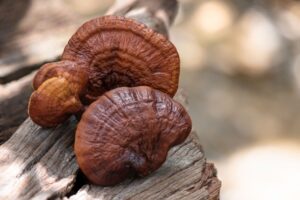What's On This Page?
ToggleHalloween is creeping up, and what better time to talk about something a little spooky—like fungi? But I’m not talking about the mushrooms you find growing in your yard. Instead, let’s chat about medicinal mushrooms that have been used for centuries to promote health and wellness. These three “frightful fungi”—Reishi, Lion’s Mane, and Chaga—aren’t just for witches’ brews anymore. These medicinal mushrooms have become popular natural remedies that can sometimes rival pharmaceutical drugs for certain conditions.
1. Lion’s Mane: The Brain-Boosting Sorcery
Lion’s Mane is a unique mushroom that has a white, shaggy appearance, resembling a lion’s mane. It’s not only a great addition to a warm cup of tea or coffee, but it also possesses some impressive health benefits, particularly for your brain. Studies have shown that Lion’s Mane may help with nerve regeneration and cognitive function, making it a top choice for those looking to support memory, focus, and overall brain health.
This mushroom stands out to me because it’s a key ingredient in my patented Memory Script formula. It contains compounds like hericenones and erinacines, which can stimulate the production of Nerve Growth Factor (NGF)—a protein that plays a critical role in the growth, maintenance, and survival of neurons. Essentially, Lion’s Mane helps keep those brain cells firing on all cylinders.
In a world where many turn to medications like donepezil (Aricept) for cognitive support in Alzheimer’s disease, Lion’s Mane offers a natural alternative. While drugs like donepezil can improve cognitive symptoms by increasing acetylcholine levels in the brain, Lion’s Mane works differently by promoting neuronal health over the long term. It’s not a replacement for pharmaceuticals, but it can be a great complementary option for those looking to support their brain naturally.

2. Reishi: The Calming Elixir
Next up in our lineup is Reishi, often referred to as the “mushroom of immortality.” Reishi has been a staple in traditional Chinese medicine for centuries, prized for its adaptogenic properties—meaning it helps the body adapt to stress. It’s like a natural chill pill for when life gets overwhelming.
Reishi can be especially beneficial for those struggling with insomnia, anxiety, and even immune system imbalances. Its active compounds, such as triterpenes, have anti-inflammatory effects, making it an option for those looking to manage stress-related conditions like high blood pressure.
Pharmaceuticals like benzodiazepines (think alprazolam, aka Xanax) are often prescribed for anxiety, but these drugs come with the risk of dependency and a range of side effects, including drowsiness and impaired coordination. Reishi offers a gentler alternative. It won’t knock you out like a sleeping pill, but it may help you unwind enough to drift off naturally. Think of it as nature’s way of taking the edge off—no prescription required.
3. Chaga: The Immunity Guardian
Finally, let’s shed some moonlight on Chaga, a mushroom that grows on birch trees in cold climates and looks like a lump of charred wood. Despite its rough exterior, Chaga is packed with antioxidants and beta-glucans, making it a powerful ally for immune health. It’s known to support the body’s natural defenses and may even have antiviral properties, which is why it’s often used during cold and flu season.
Chaga’s immune-boosting abilities have been compared to those of pharmaceutical antivirals. While drugs like oseltamivir (Tamiflu) are effective for managing flu symptoms and shortening the duration of illness, they must be taken within a very short window after symptoms begin. Chaga, on the other hand, can be consumed regularly as a preventative measure to keep your immune system in tip-top shape.
Of course, I always remind people that mushrooms like Chaga are not a substitute for vaccines or antiviral medications when it comes to preventing serious viral infections like influenza. But for general immune support during the colder months, Chaga can be a helpful addition to your routine. Brew it into a tea, blend it into your morning smoothie, or even sprinkle it into soups for a cozy, health-boosting treat.
Comparing the Magic: Mushrooms vs. Medications
Each of these medicinal mushrooms—Lion’s Mane, Reishi, and Chaga—brings something unique to the table, and they compare to pharmaceuticals in different ways. While medications often target specific symptoms with immediate effects, mushrooms work more slowly and holistically, supporting your body’s natural processes over time. Think of them like the friendly ghosts of the health world—gentle, effective, and always there to lend a hand when you need a little boost.
For those looking to complement their conventional treatments with something natural, these fungi can be a great option. And the best part? They don’t require a trip to the pharmacy, just a little time, and perhaps a dash of curiosity to explore the world of medicinal mushrooms.

Mycotoxins and Medicinal Mushrooms
While Lion’s Mane, Reishi, and Chaga mushrooms do not produce mycotoxins naturally, the risk of contamination can arise from improper cultivation, harvesting, or storage conditions. Therefore, the focus should be on sourcing high-quality, tested supplements from trusted suppliers to ensure they are free from contaminants like mycotoxins.
This is particularly important because people with a history of fungal sensitivities or immune conditions may be more hesitant to take these worried about potential contaminants in supplements. Fair!
The medicinal mushrooms mentioned in the blog, Lion’s Mane, Reishi, and Chaga, are generally considered safe and do not produce mycotoxins themselves. Here’s a closer look at each and their relationship with mycotoxins:
1. Lion’s Mane (Hericium erinaceus):
- Mycotoxin Production: Lion’s Mane is not known to produce mycotoxins. It is primarily used for its potential benefits in promoting nerve health and cognitive function.
- Quality Concerns: Like any mushroom, the quality of the growing and harvesting environment is important. If grown or stored in conditions that encourage contamination by other fungi, there could be a risk of exposure to mycotoxins from other sources. Thus, it’s crucial to purchase Lion’s Mane from reputable suppliers who ensure a clean growing environment and proper drying and storage methods.
2. Reishi (Ganoderma lucidum):
- Mycotoxin Production: Reishi mushrooms themselves do not produce mycotoxins. They are known for their adaptogenic and immune-modulating properties.
- Quality Concerns: As with Lion’s Mane, the risk of mycotoxin contamination comes more from improper growing, harvesting, or storage conditions rather than from the Reishi itself. If grown on substrates that are prone to mold growth, like poorly maintained wood or soil, contamination could occur.
3. Chaga (Inonotus obliquus):
- Mycotoxin Production: Chaga is also not known to produce mycotoxins. It is highly antioxidant-rich and often used for immune support.
- Quality Concerns: The primary issue with Chaga comes from environmental factors rather than its own biology. Since it grows on birch trees in cold climates, if harvested from contaminated trees or regions, or if stored improperly, it could theoretically become contaminated by molds that produce mycotoxins. Again, sourcing from a reputable company is key to avoiding contamination.
⚠️ Caution: When adding medicinal mushrooms like Lion’s Mane, Reishi, or Chaga (or others) to your health supplement regimen, always choose high-quality, third-party tested products to ensure they’re free of contaminants like mycotoxins. This ensures you’re getting the pure benefits of these fungi without any unwanted surprises.
Mold Exposure and Medicinal Mushrooms
What if you have a history of mold exposure? Most people (depending) can *generally* take medicinal mushrooms like Lion’s Mane, Reishi, and Chaga. You can tell I’m being cautious, can’t you?! But here’s the point I want to make: If you have had serious mold exposure, proceed with caution and follow these important considerations and of course, ask your physician if it’s okay or not:
1. Quality Sourcing is Essential
- People with a history of mold exposure or sensitivity are more vulnerable to reactions from even trace amounts of mold or mycotoxins. Therefore, it’s crucial to select high-quality mushroom supplements that have been rigorously tested for purity. You can ask a company for their Certificate of Analysis to prove their product is clean and that it passed the test for mold/mycotoxins. I do this all the time for my customers who are mold-sensitive and want Memory Script.
- Look for products that are certified organic, third-party tested, and free from contaminants, including mycotoxins, heavy metals, and pesticides. Reputable manufacturers will often provide this information on their websites or upon request. Again, this is referring to a Certificate of Analysis. Hopefully, the supplement company you ask for doesn’t fake this document… because in a day and age of AI, you have to hope they’re being honest! I hate to say this but it’s true.
2. Extracts Over Whole Mushrooms
- For those concerned about mold exposure, using hot water or dual extracts of these mushrooms is often safer. The extraction process typically involves heat, which can help reduce the risk of mold contamination that might be present in raw or improperly dried mushroom products.
- Extracts like those used in tinctures or powders are often less likely to harbor mold or other contaminants compared to whole, dried mushrooms.
3. Start Slowly and Monitor Reactions
- People with a history of mold exposure may have a heightened immune response to fungal components, even if they are non-toxic or medicinal. It’s wise to start with a low dose of any new mushroom supplement and gradually increase it while monitoring for any adverse reactions.
- Symptoms to watch for could include digestive upset, allergic-type reactions like itching or skin rashes, or a flare-up of symptoms related to past mold exposure. If any of these occur, discontinuing use and consulting with a healthcare provider is recommended.
4. Consult with a Healthcare Professional
- It’s always a good idea for individuals with a history of mold-related illness, such as chronic inflammatory response syndrome (CIRS) or mold-related allergies, to consult with a healthcare provider before starting any new supplement, including medicinal mushrooms. This is particularly important because the immune system in these individuals may react differently.
Mushrooms vs. Mold: Not All Fungi Are the Same
- It’s important to remember that the medicinal mushrooms mentioned (Lion’s Mane, Reishi, Chaga) are different from the molds and fungi that produce harmful mycotoxins. Medicinal mushrooms have a history of safe use and can offer significant health benefits, including supporting immune function and reducing inflammation.
- The key distinction is that these mushrooms do not inherently produce the toxic substances associated with harmful molds (like Aspergillus, which produces AFLATOXIN). Instead, medicinal mushrooms can actually help the body cope with the stresses of past mold exposure by supporting immune balance and reducing oxidative stress.
Bottom Line: Proceed with Caution but with Hope
- Medicinal mushrooms like Lion’s Mane, Reishi, and Chaga can be part of a wellness plan for people with a history of mold exposure, but only when carefully chosen for quality. These mushrooms offer unique benefits, such as Lion’s Mane’s support for brain health, Reishi’s calming properties, and Chaga’s immune-boosting antioxidants, which could be especially useful for those looking to rebuild their health after mold-related illnesses.
In summary, yes, individuals with a history of mold exposure can consider using these medicinal mushrooms, but it’s crucial to select high-quality products, start with a low dose, and monitor their body’s response. This approach ensures that they can potentially enjoy the benefits of these natural remedies without triggering sensitivities.
The Coffee Trend
Something I want to give honorable mention is the coffee trend. There is definitely a growing trend in the world of coffee featuring medicinal mushrooms, and it has become quite popular over the last few years. Many companies are blending coffee with powdered extracts of medicinal mushrooms to create beverages that are marketed as providing a range of health benefits. These mushroom-infused coffees appeal to those looking to enhance focus, energy, and immune support while reducing the negative effects of caffeine. You can find these online and at health food stores. The taste varies depending on the medicinal mushrooms they use, and also the quality varies from company to company.
Other Medicinal Mushrooms to Know About
While Lion’s Mane, Reishi, and Chaga are some of the most popular choices in the world of medicinal mushrooms, they’re not the only ones with impressive health benefits. Here are a few other fungi that deserve a spot on a health enthusiast’s radar:
- Cordyceps: Often used for its energy-boosting properties, Cordyceps can support stamina and endurance, making it a favorite among athletes and those looking to increase physical performance. It may also help improve lung function and oxygen uptake, making it beneficial for respiratory health. Cordyceps is commonly found in energy-boosting blends and pre-workout supplements.
- Maitake (Grifola frondosa): Known as “Hen of the Woods,” Maitake is rich in beta-glucans that support immune function. It has also been studied for its potential benefits in managing blood sugar and supporting metabolic health, making it a good option for those looking to balance their blood glucose levels.
- Shiitake (Lentinula edodes): Often found in kitchens as well as medicine cabinets, Shiitake is a versatile mushroom that’s rich in vitamins, minerals, and unique compounds like lentinan, which may have immune-supporting properties. It’s also thought to support heart health by helping to manage cholesterol levels. A while ago, I wrote this ARTICLE f on how shiitake supports people with cancer.
- Turkey Tail (Trametes versicolor): This colorful mushroom is well-regarded for its potential to support immune health, particularly because of its high concentration of polysaccharopeptides (PSPs) and beta-glucans. Turkey Tail has been researched for its supportive role in immune modulation, especially during conventional cancer therapies like chemotherapy.
- Agaricus (Agaricus blazei): This lesser-known mushroom is gaining attention for its immune-supporting properties, and it’s sometimes referred to as “Himematsutake” or “Royal Sun Agaricus.” Studies suggest it may help the body combat oxidative stress and support overall immune balance.
Each of these mushrooms has its own unique strengths and potential health benefits, adding even more variety to the world of medicinal fungi. Whether you’re looking to support your immune system, boost energy, or balance your metabolism, these additional mushrooms offer plenty of natural options to explore.
Brewing Up Health This Halloween
As the nights grow longer and the spooky season settles in, consider adding a little mushroom magic to your wellness routine. Whether it’s sipping on a warm Lion’s Mane latte, relaxing with a Reishi tea before bed, or keeping your immune system strong with Chaga, these “frightful fungi” might just be the trick—or treat—you need this October. Stay healthy, stay curious, and enjoy a bewitchingly wonderful Halloween season!

Suzy Cohen, has been a licensed pharmacist for over 30 years and believes the best approach to chronic illness is a combination of natural medicine and conventional. She founded her own dietary supplement company specializing in custom-formulas, some of which have patents. With a special focus on functional medicine, thyroid health and drug nutrient depletion, Suzy is the author of several related books including Thyroid Healthy, Drug Muggers, Diabetes Without Drugs, and a nationally syndicated column.




